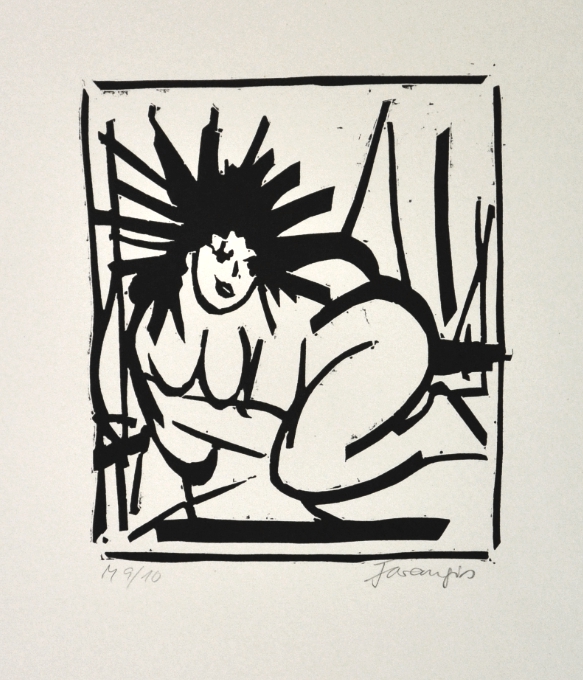In some biografical context with our page about ‘punk as a search for female autonomy‘ and things … :
Talking about having been a punk in the early 80ies. The photo from the left is from 1983, the year when Rudimentary Peni released their album Death Church, one of the records that would most definitely influence my future.
Already at the 5th grane in school I messed around with any things I could find that went into a punk-type of direction. I later figured out that any of the people I met who ran around as punks, everyone had their own kind of mosaic they set together, consisting of bands, messages, expressions and probably ideas, aesthetics, political tendencies.
The punk scene in the town I lived in was basically racist or very “völkisch”-minded – they would never admit that today, where people at least act more informed. There were one or two ethnic minority type of people in the “scene” here, yet in my perception they seemed to bend themselves pretty extremely in order to match into the dynamics of the “scene”.
I considered the punks in the town to be pseudo to my taste – one part of them was oriented towards the end 70ies kind of still rock-n-roll-influenced punk (the kind of music where a certain type of “maleness” was still heavily given expression), the other part were hardly into any music developments, but rather consumed what the “scene” circulated, they hung around drinking and chatting, making themselves visible in the “scene” by playing some role, going to gigs for “fun”-sake to prove their authenticity.
After all what was that made up the movement was the international aspect of political grassroots independent crappily played music that was exchanged/expressed/played.
The problem was we didn’t have the exciting bands coming here. So to me this meant visiting the UK a lot.
The aspect of punk being a protest movement was only the looks and the bunching up in a group with some locally typical kind of group behaviour and rites amongst the punks (and later partly the “autonomous” people in the town where I lived in Germany. The autonomous scene kind of realized that punk was about voicing socio-political issues, but they heavily stumbled over their völkische dynamics equally – they still do up till today. Germany is full of cosmetic diversity, and sometimes I get the impression the ethnic minorities here are comfy with it … (long issue and to complicated to fit into a random note about the early 80ies).
I met no one whom I could a.) make music together with, that would contain like feminist or/and animal rights messages b.) I met no one whom I could talk critically about society with. It was in a plain desert of concerted superfiliatiy in how imported subculture was translated into own subculture, boasting group danamics, standards, partly graspable partly subtle “völkischem” Gehabe of urban German cold-war-times adolescence.
***
So you would find the excellent records of bands such as Icons of Filth, Rudimentary Peni, Conflict, Crass, The Apostles, Flux of Pink Indians, Exit-Stance, Subhumans to name a few in some record shop/s downtown and especially in one shop in Berlin for example, or you could get infos/tapes from people abroad who’d potentially focus differently in their choices of what they considered recommendable. The punk movement in the town where I lived as a youth was mentally nauseatingly conservative-minded.
No wonder Germany is the only place where punk was to become the fame room for soccer-type groaling virility in music – harcore riffs turned völkisch-progressiv – markedly “anti-racist”, in case one doesn’t sense that right away. The point that hardcore stayed mostly invisible to the maistream here, is an interesting fact that needs to be analyzed.
If I was an anthropologist into music science I would make a systematic comparison of bands and tracks from here with genre-close bands and tracks from abroad.
To sum up my sentiment about my practiced youth culture: I notice that there are two main sides to it, one is the experiences I made locally in Germany.
I figure most white people here who identify as Germans likes clear lines, clear groups, clear identities you belong to, no threats to demarkation lines. You have a box, for instance for “hardcore”, and if a track is designated and fitting the box, fine, “it is what it is” then, but the hidden lines, the subtleties, the more complex realities are blurred out and have no accepted space here. It’s more of a play with labels, fitted with content that may undermine the ideas that underlied the evolvelent of an imported lable.
To close this here is a random personal top ten list in punk and hardcore, or some songs that I would recommend to the people I met in the past – to understand why I still think they are very very pseudo with the selection of the bands/messages/political outlooks they upheld/uphold > this is my selection, some songs are newer though:
The Apostles – Proletarian Autonomy
Penetration_Dont_Dictate
oxblood_police
exitstance_slaughterhouse
english_dogs_left me for dead
discharge hell on earth
Destructors – Image
Confirmed_Kill__Chains_of_Production ( less known hence a link to find it easily https://www.youtube.com/watch?v=W7bl-QgJVv4 )
Burnt Cross ‘look into their eyes’
Broken Bones Decapitated; Intro (instrumental)
Bad Brains – Give thanks and praise_jah love
Anti_System_Wot_No Meat
The Ex A Sense Of Tumour –
Flux of Pink Indians Tube Disasters
Now that I grew old I felt I once needed to die my hair again. Here a grumpy pic, I am there together with my husband Lothar, below more friendly looking … after bleaching I lost a lot of hair, unfortunately (well, own fault).






3 replies on “Punk as a search for female autonomy”
[…] Ich war oft in London, da wir dort eine Zweitwohnung besaßen. Bewegte mich aber auch in besetzten Häusern/Wohnungen. Mir ist damals aufgefallen, dass Leute aus DE die Situation in England sehr unterschiedlich rezipierten. Hier etwas auf English zum Thema having been Punk in the early 80ies > https://simorgh.de/biografie/punk-as-a-search/ […]
[…] And here notes in English with links to out art section on “Punk as a Search for Female Autonomy” https://simorgh.de/biografie/punk-as-a-search/ […]
[…] And here notes in English with links to out art section on “Punk as a Search for Female Autonomy” https://simorgh.de/biografie/punk-as-a-search/ […]